I hope you read my long piece last week about the error-filled bombast at The New Yorker et al that linked Francis Schaeffer and Nancy Pearcey to the discredited, fringe, off-shoot of conservative Reformed theology, called Theonomy. (The writer of said piece, a Mr. Lizza, following others, termed this Dominionism and then in other outlets seemed to implicate any Christian who wants to honor God by serving the public good with Biblically-derived ideas. Lizza has been lionized by the left and roundly rebuked by the religious.) I offered good links to a few who responded to this woefully ignorant reportage and some of my own ruminations on Schaeffer (Francis and son Frank) and Ms Pearcey, whose books we carry. We then offered a rather diverse array of books that promote further thinking and talking about all this, resources to have ready as we talk with our neighbors, write letters to the editor, start book clubs and otherwise take steps to put forward a decent, coherent and just understanding of the relationship of faith and culture, religion and the public square, church and state.
I noted that my list is diverse and valuable and a few of the titles are truly brilliant. Is there somebody you might want to forward that list to? I’m confident there are some real winners there. Maybe somebody should send some to their own local journalists. At the very least, this fine piece on anti-religious prejudices in the newsroom, thoughtful explored by journalist Rod Dreher. It is well worth reading.
THE PROBLEM HAS NOT GONE AWAY
We were a bit ahead of the curve on this most recent chapter of this frustrating story, but it has gone viral–from various quarters—and it hasn’t gone away. National news outlets and hundreds of prominent blogs, and now an insulting and sophomoric (if cleverly-written) editorial by the–oh my–Executive Editor The New York Times continue to repeat this shoddy coverage of conservative religion. (The prominent Mr. Keller says he is going to ask and then report the answers to “tough questions” about the religion of the candidates and yet he in his inaugural volley repeats like it is some big deal the publicly discredited Schaeffer-Dominionist trope.) Well, we’ve spoken about that enough for now, which leads me to this remarkable, brand new book. I’m grateful that a number of BookNotes fans posted my column–it is good to think it maybe helped a bit.
SADDENED
As I indicated in that August “monthly review column” I have been deeply saddened by this angry mocking of conservative religion and the angry push-back by conservatives and nobody, that I know of, admitting they made any errors in judgement. The ridiculous statements from the secular left are matched by hostility on the religious right. And many in the middle are muddled—maybe me, too. So much of it is heartbreaking, and I have used that word knowingly.
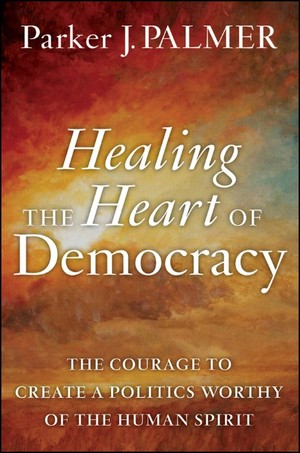 Imagine my surprise, then, when I picked up the brand new book by Parker J. Palmer, Healing the Heart of Democracy: The Courage to Create a Politics Worthy of the Human Spirit (Jossey Bass; $24.95) to find this opening line:
Imagine my surprise, then, when I picked up the brand new book by Parker J. Palmer, Healing the Heart of Democracy: The Courage to Create a Politics Worthy of the Human Spirit (Jossey Bass; $24.95) to find this opening line:
“I began this book in a season of heartbreak—personal and political heartbreak—that soon descended into a dark night of the soul.”
I read twice the wonderfully rich and tender prelude, “The Politics of the Brokenhearted” and it reminded me of an earlier piece he had written in another collection, years ago (which I will mention below) also about heartbreak and citizenship. Although Palmer started writing this book more than 8 years ago, it felt to me like it was written yesterday. I’ve had an advanced copy of this for a while, and intended to wait for the right time to pick it up; in fact, I forgot I had it. In what I assume was an act of gracious providence, I spotted it just a few days ago while looking for something else in my piles, and took it up almost immediately. It was just what I needed. And you? He says it was his hardest book to write. I think it will speak to many.
I will return to this theme of sadness, but first just a bit of background. You may or may not know about Parker Palmer’s remarkable career, his friendship with the likes of contemporary contemplatives such as Howard Thurman, Gerald May, even Thomas Merton, or his writing about the inner life, especially as it relates to daily living, public life, work, calling, careers. The Active Life: A Spirituality of Work, Creativity and Caring (Jossey-Bass; $16.95) is a masterpiece, I’d say, and not too long ago a paperback version of A Hidden Wholeness: The Journey Toward an Undivided Life (Jossey-Bass; $19.95) came out in an edition that includes a DVD. The small, handsome hardback Let Your Life Speak: Listening for the Voice of Vocation (Jossey-Bass; $18.95) is a classic.
The title of his very first book is also a phrase–“in the company of strangers”—which re-appears in this new one, and it is in some ways a revisiting of this early theme, ruminating on the interface of our deepest inner lives and our civic involvement, how we live in public amongst those that may be different than we. Indeed, this new book is explicitly calling for a “politics of the heart” and invites us to bring our deepest yearnings, emotions, insights, and values to the hard world of data and facts and reason. This is grounded in some very impressive scholarship about which he has written nicely in the past.
For instance, his famous little book on epistemology and education, To Know as We Are Known: Education as a Spiritual Journey (Harper: $13.99), reminds us that in the Bible (and other great spiritual traditions) authentic knowledge involves head and heart and hands and is always a relational matter; we “know” in ways that are more than just rational. Yada, the Hebrew word for knowing, is also the word for sexual intercourse and implies so much more than merely an Enlightenment view of mastering facts in our head—relationship, responsibility, and affection.) That wholistic view of knowing deeply–with the heart, as it were—gave rise to a particular view of education and teaching, and he then wrote about that. Palmer became justly famous for The Courage to Teach: Exploring the Inner Landscape of a Teacher’s Life, now in a 10th Anniversary edition (Jossey-Bass; $27.95.) Soon, a book followed it, a collection of serious narratives of people who nurtured learning communities of caring, inspired by the methodology and vision of Courage to Teach simply called Stories of the Courage to Teach, compiled by Sam Intrator (Jossy-Bass; $18.95.) That anthology showed that all sorts of educators–in colleges, in elementary schools, in seminaries, in prison groups, in senior centers, in doctoral programs, in adult ed study book clubs—could, in fact, teach with the heart.
CITIZENS OF HEART
Can we, as citizens, like those teachers, embrace this “hidden wholeness” in our public lives? Can we use our intuitions and feelings and values (and the heaviness of our hearts) as well as are brains to consider political proposals and work with neighbors for the betterment of our polis? Can we bring our whole hearts to the public square? 

I deeply resonate with this and while it is a different approach and vocabulary than
the historic Calvinism of Schaeffer and Pearcey of which I have written before, it seems to be a healthy next step in that conversation. With Dutch Statesman Abraham Kuyper (and Schaeffer and Pearcey) some of us want to honor Jesus Christ in every sphere of life and while we resent cheesy accusations of crusading “dominionism” we cannot privatize our faith, marginalize our convictions, give up on our desire to serve the common good by proposing what we think the Good Book has to say about our life together under the sun. Serious evangelical intellectuals have given us paradigms and methodologies of discerning how best to do this. We’ve been offered good books that have critiques of ideologies and insights about hermeneutics, ways to imagine the political implications of general Biblical truths, without overstating things and without hubris.
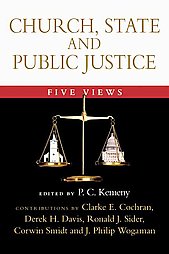 Justice: Five Views edited by P.C. Kemeny ( IVP; $19.00) which shows the general commonality of the discourse despite the very large differences of opinion. Ron Sider’s exceptionally thoughtful and thorough The Scandal of Evangelical Politics (Baker; $20.00) is another very helpful example that walks one through a set of questions in order to develop some balanced Biblical vision, from which might emerge a political philosophy, from which we might humbly propose some tentative policy points. Or visit the interesting website of the Center For Public Justice, an non-partisan, mostly Reformed think-tank and center for Christian citizenship.]
Justice: Five Views edited by P.C. Kemeny ( IVP; $19.00) which shows the general commonality of the discourse despite the very large differences of opinion. Ron Sider’s exceptionally thoughtful and thorough The Scandal of Evangelical Politics (Baker; $20.00) is another very helpful example that walks one through a set of questions in order to develop some balanced Biblical vision, from which might emerge a political philosophy, from which we might humbly propose some tentative policy points. Or visit the interesting website of the Center For Public Justice, an non-partisan, mostly Reformed think-tank and center for Christian citizenship.]
Having done this sort of intellectual work, grappling with a theological worldview and a Biblical perspective on statecraft—yes, it is what Christians do—how then do we embody that, lean into and work for it, walking into the pluralistic culture, alongside our fellow citizens in this flurry of frustration we call democracy? After the Biblical study and policy discussion, at the end of the day, don’t most people of faith–you and I—just want to serve the common good, make our towns and states and nation a bit better? To be good citizens as the Bible teaches? Love our neighbors, also in our politics? Here, Palmer’s Healing the Heart of Democracy is wise, kindly, and urgently needed because he is showing us how to reweave the tattered fabric of our communal life and how to “walk on” as part of a commonweal. He is good at this stuff, how to take next steps amidst tensions. He is gifted and experienced and truly wants to bring a variety of voices to the conversation.
HOLDING TOGETHER TENSIONS – LIVING IN CONFLICTED TIMES
One of the big points in this book is the need to hold together various tensions, to hear each other out without demonizing one another. (He tells of people coming to workshops to find common ground on abortion, even, and although it isn’t easy, such small steps are happening. Some deeply divided communities are working towards some common concerns. His reports from the field of “getting along” and “listening well” are very instructive and should make us glad.) And, be clear—he shows us not so much how to resolve conflict, but how to learn to live with our deepest differences. Our religious, cultural and political differences are not going to go away, after all.
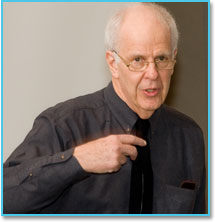 You may think that since Palmer is a kind-hearted Quaker, he tends towards sentimental ideals—“Can’t we all just get along?”—and you would be wrong. Yes, Palmer talks about the centering role of silence and solitude and has a fluency in the mystical traditions, but he is also seriously aware of the ways in which on-the-ground cultural and political differences are real, and can either be voiced in healthy ways or in destructive ways. He was an early student of the civil rights movement and was as anguished as most activists at the upheaval of the last 60s. He knows much of this in his bones and, I suspect, carries it deeply within him. Gee whiz, he even tells the story of how Martin Marty apologized for a bad review written in the Christian Century of Thomas Merton’s 1964 Seeds of Destruction when Marty thought that Merton was being needlessly flamboyant in his prediction of the racial wars to come. Who knows this kind of stuff except those who had their ear to the ground and their heart on their sleeve in those hard years?)
You may think that since Palmer is a kind-hearted Quaker, he tends towards sentimental ideals—“Can’t we all just get along?”—and you would be wrong. Yes, Palmer talks about the centering role of silence and solitude and has a fluency in the mystical traditions, but he is also seriously aware of the ways in which on-the-ground cultural and political differences are real, and can either be voiced in healthy ways or in destructive ways. He was an early student of the civil rights movement and was as anguished as most activists at the upheaval of the last 60s. He knows much of this in his bones and, I suspect, carries it deeply within him. Gee whiz, he even tells the story of how Martin Marty apologized for a bad review written in the Christian Century of Thomas Merton’s 1964 Seeds of Destruction when Marty thought that Merton was being needlessly flamboyant in his prediction of the racial wars to come. Who knows this kind of stuff except those who had their ear to the ground and their heart on their sleeve in those hard years?)
To suspect Palmer of romantic, genteel idealism is understandable—let’s face it, this is not The Art of War or a pragmatic guidebook in the spirit of Karl Rove (or Saul Alinksy, for that matter.) But Palmer is politically savvy and street smart and considerably chastened by the stuff he has seen while pondering, acting and mentoring public figures over most of his lifetime. A few of the great stories in Healing the Heart… are about political activists, legislators, people in positions of influence, as they struggle to follow their hearts, living out their deepest beliefs in their offices.
As an organizer and advocate for social change Palmer is not unrealistic when he reminds us that good conversation, art and poetry and empowering education can help us. (He is, more than anything, a teacher, after all.) The right art and practicing attentiveness to it helps us become people who are deeper, who can host differences, live into tensions and conflict, and be decent with others, showing hope and grace and goodness. This “liberal arts” view is not silliness, not at all. And to bring such art and poetry into our own interior selves, well this is transformative. This focus on the heart, and being in touch with our sadnesses, is not poppycock. Palmer argues here that it is essential work not just for personal wholeness and health, but for serious citizenship.
HABITS OF THE HEART — AT THE LOCAL LEVEL
No it is not poppycock or sentimentalism. After all, it was the famous French scholar Alexis de Tocqueville (who Palmer cites often) who coined the phrase “habits of heart” and insisted that Americans need some way to keep these character traits of virtue alive if democracy is to survive. Palmer’s wide-ranging study shows how our habits of heart might be more intentionally nurtured in order to fund a robust, fair-minded, and truly effective local civic life.
The notion of a “local” “civic” life–civil society, mediating structures, third places and such–is not new but Palmer explores it here as nicely as in anything I’ve read in recent years. He extols third places, invites us to think about the “pre-political” and promotes the development of trust-building dialogue groups. (My friend Steve Garber of the Washington Institute on Faith, Vocation, Culture, who hosts discussions about living passionately as Christians in various career areas in what he calls Vocare groups, creates space for what he terms “conversations of consequence.”) Palmer says such meaningful conversations happen best in “circles of trust” and then surprised me with a funny footnote about the Robert DeNiro character in Meet the Parents.) Interestingly, he even has a section about how trust-building citizenship enhancing communities can form even on line. The dude is ov
er 70 and affirms ways our social medias can help create healthy civic discourse!
DEEPENING THE AMERICAN DREAM
I noted that Palmer started his career thinking about public life. Indeed, I have a series of papers he wrote about how higher education might speak to the cultural crisis of the early 70s, published by the National Council of Churches, and an early book of his was about civic life. He then became known in education, wrote a book on calling (inspired by his sense that the best teachers worked from their heart because they viewed their jobs as a holy vocation.) He has written several books about spirituality, contemplation in a world of action. Last year he won the prestigious William Rainey Harper Award (that has previously been awarded to Margaret Mead, Paulo Freire and Elie Wiesel.) Earlier this year he co-authored a book on how college life might be enhanced through “collegial conversations.”
As writer and “public intellectual” Palmer has never been far from politics, though, and has recently been behind the scenes networking people to ask big questions about our own dreams for a new politics, finding common ground, talking genuinely about our differences. He has helped organize a couple of conferences on this topic through his work as Senior Partner of the Center for Courage and Renewal.
We had the wonderful opportunity to sell books for him at a very lovely gathering a few years ago (at the prestigious National Press Club in Washington DC) that included a number of excellent speakers, addressing these exact themes. (One of the highlights of that event was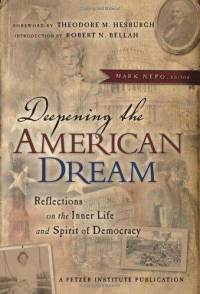 meeting Vincent Harding!) That conference actually celebrated a book edited by Palmer’s friend, Mark Nepo entitled Deepening the American Dream: Reflections on the Inner Life and Spirit of Democracy (Jossey-Bass; $24.95.) Some of the distinguished authors in that good volume include Gerald May, Jacob Needleman, Elaine Pagels, Robert Inchausti and Robert Bellah. What Palmer introduced in his important essay in that collection, the one about a politics of the broken heart, comes to full flower here. That anthology was important but this new book will truly help us reconnect who we are with what we do, and how we do it— yes, even in these heartbreaking times of culture wars, loud accusations, and divergent worldviews clashing in the public square.
meeting Vincent Harding!) That conference actually celebrated a book edited by Palmer’s friend, Mark Nepo entitled Deepening the American Dream: Reflections on the Inner Life and Spirit of Democracy (Jossey-Bass; $24.95.) Some of the distinguished authors in that good volume include Gerald May, Jacob Needleman, Elaine Pagels, Robert Inchausti and Robert Bellah. What Palmer introduced in his important essay in that collection, the one about a politics of the broken heart, comes to full flower here. That anthology was important but this new book will truly help us reconnect who we are with what we do, and how we do it— yes, even in these heartbreaking times of culture wars, loud accusations, and divergent worldviews clashing in the public square.
I like how Mr. Palmer describes democracy as having an “ecosystem” and he describes it in suggestive ways that made me think. One chapter is called “The Loom of Democracy” and in another chapter he has a sub-heading “The Promise of Neighborhoods” with both images indicating his concrete vision, his down-to-earth hope that we will be busy, doing the work of citizenship, day by day. This truly gets beyond the most obvious partisan distinctions—he celebrates the “little platoons” of Edmund Burke and invites us to resist the “decline in public life” by banding together with friends to be more involved in local happenings. His citations of Bill Moyers, and Robert Putnam, poets Walt Whitman and Emily Dickinson, or social critics like E.F. Schumacher, may appeal to those who slide towards the political left but his extensive use of Abraham Lincoln may make allow this book to become a considered recommendation for conservatives, as well.
LINCOLN’S MELANCHOLY
It is commonly agreed that in the Second Inaugural address Lincoln invited us to some of the most generous and profound ideals, delivered in some of the grandest eloquence, in our nation’s history so this isn’t anything to roll one’s eyes about–it is wonderful primary source stuff he is citing, substantive and momentous. (He cites some other, lesser known Lincoln speeches as well to wonderful effect.) Palmer plumbs this material well and it is more than inspiring, it is a clarion call to renounce our current culture wars and incivility and with great intentionality, to forge a better way.


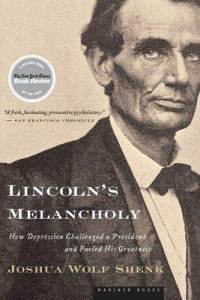 It is not just a matter of passing interest (although it is very interesting) that Palmer draws significantly on the award winning study of Lincoln’s depression, Joshua Shenk’s Lincoln’s Melancholy: How Depression Challenged a President and Fueled His Greatness (Marainer; $14.95.) Mr. Palmer takes heart that this sad, great man was able to so ably lead our broken nation. This is a key to the book: it is our broken-heartedness that we must bring to the table. We must do inner work to be in touch with our disappointments and pains, and such self-awareness can drive us to honor the disappointments in others. As we tend to the heart of the matter, often the broken heart of the matter, we will be more humane, more kindly, more insightful, and more resolved to do the good work of building civic community, long before we enter the contentious field of partisan elections or policy disputes. As in his other books he draws a fairly direct line from “inner liberation to outward transformation.”
It is not just a matter of passing interest (although it is very interesting) that Palmer draws significantly on the award winning study of Lincoln’s depression, Joshua Shenk’s Lincoln’s Melancholy: How Depression Challenged a President and Fueled His Greatness (Marainer; $14.95.) Mr. Palmer takes heart that this sad, great man was able to so ably lead our broken nation. This is a key to the book: it is our broken-heartedness that we must bring to the table. We must do inner work to be in touch with our disappointments and pains, and such self-awareness can drive us to honor the disappointments in others. As we tend to the heart of the matter, often the broken heart of the matter, we will be more humane, more kindly, more insightful, and more resolved to do the good work of building civic community, long before we enter the contentious field of partisan elections or policy disputes. As in his other books he draws a fairly direct line from “inner liberation to outward transformation.”
As I write about this here it sounds nearly like shallow psycho-babble, new-agey pablum, but Mr. Palmer is too astute to allow for cheap solutions. If you are inclined to psychological language, I suppose you will love this book. Few have brought the psychology and interior lives of our selves and our neighbors into the public arena quite so well. However, please do not let any presumption that this is silly or mystical dissuade you from getting this book. Business writer Peter Block calls it “fiercely realistic.” Again, he is drawing on Abraham Lincoln. He quotes Reinhold Niebuhr’s The Irony of American History published by University of Chicago Press, for heaven’s sake.
The subtitle of this work is important. Palmer invites us to summon “the courage to create a politics worthy of the human spirit.” He believes this happens, mostly, as I’ve suggested, at the local, “pre-political” level, and it does, in fact, demand courage. It is not a small matter to be in touch with our own fears and foibles and to be gracious about them as they appear in our fellows. Good citizenship, though, demands that we listen to our hearts, and listen to the hearts of our neighbors. Not only does this take exacting inner disciplines, but it demands a sense of place. We must listen to our neighbors, our neighborhoods, our land. We need a multi-faceted, perhaps less dramatic, view of our civic involvement. Being a good citizen includes so much more than merely showing up to vote every so many years or sending off an electronic petition. We must be invested in the real, human infrastructure, care about the membership of the commonwealth. Does it surprise you that Mr. Palmer quotes the farmer poet from Kentucky?
Palmer tells many great stories throughout the book. It is not mysterious or recondite but when it even verges on sliding into an overly abstract view, he reminds us of our common ground as humans by telling a good story. And the stories are often fabulously inspiring. A few are fairly mundane, and they are as good as the ones, say, from the civil rights movement, that are more dramatic.
(Ahh, the story he tells of why an African American Sunday school class at Koinonia Farms used Roberts Rules of Order is so illuminating!)

Healing the Heart of Democracy by Parker Palmer is a book about good folk who care to be in touch with what they most surely know, from paying attention to their wounds, their fears, their places, their community (or lack of community.) And who care to know how to talk about that with others, who, carrying their own hurts and needs and fears, may have very different values and proposals, with both sides fearful and angry with each other. This is not easy work and it doesn’t lead to simple answers. We need to tell our stories, but that is only the beginning; we live in a harsh world of power and money and injustice and duplicity and he knows it. Such “heart work” is, nonetheless, the only hope for sustainable steps forward for our civil union. To help us get there he offers a brief “theology of hospitality.”
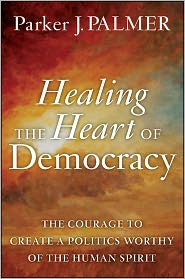 Healing… is a book for our times, needed always, I suppose, but certainly now. (Yes, certainly, this very week!) It is a book local groups should read, study, talk about. It has at times a tone of spirituality and of course talks about the heart, the core of our being, our deepest sense of our identity and such but it is not sectarian and could be shared with nearly anyone. His anecdotes and stories tend often to arise from progressive movements for social change (like the Highlander School who taught Rosa Parks and countless others in civil rights organizing) and he tells examples of community organizers, those working with the disenfranchised, or farmers resisting the lures of agribusiness. These are worthy of great consideration and I hope that no one is turned off by his tendency to hold up such remarkable examples.
Healing… is a book for our times, needed always, I suppose, but certainly now. (Yes, certainly, this very week!) It is a book local groups should read, study, talk about. It has at times a tone of spirituality and of course talks about the heart, the core of our being, our deepest sense of our identity and such but it is not sectarian and could be shared with nearly anyone. His anecdotes and stories tend often to arise from progressive movements for social change (like the Highlander School who taught Rosa Parks and countless others in civil rights organizing) and he tells examples of community organizers, those working with the disenfranchised, or farmers resisting the lures of agribusiness. These are worthy of great consideration and I hope that no one is turned off by his tendency to hold up such remarkable examples.
Yet, clearly, again, this is not about how to work for the Democratic party or some lefty progressive faith movement and he is as even-handed as he can be. This is about democracy. It is about America. It is about the real tensions of our current civic lives and the need for new approaches—literally newly found places (he even mentions malls)—to make democracy work at a local level. It is about reclaiming safe public space for democratic conversations of consequence.
It is practical, but it is not a handbook; there is no blueprint. It is a reflection, a call, a rumination. And at times it is truly wondrous. the
For instance, he writes,
America’s founders realized that generation after generation of citizens would need to stay in the action lest the political movement they planted whither and die. So they built opportunities for continual renewal into democracy’s infrastructure… As the journalist Jon Meachum observed in his review of Joseph Ellis’s American Creation
How to live in a tragic milieu and yet strive toward triumph….was a consuming concern for the founders, who, led by James Madison, made a virtue of creating competing centers of power within the constitutional structure… To transform disagreement from a natural source of strife into a source of stability was a crucial insight, and is arguably the great achievement of the Constitution. What frustrates the passionate about America—its creaky checks and balances, diffuse sovereignties and general aversion to sudden change—is, Ellis argues, what makes possible the triumphs we do manage to pull off.
BROKEN-OPEN HEART AND SLOW POLITICS
Can we pull it off, some slow, small triumph of democracy working? Again, Palmer says that he wrote this book in a time of sadness and that our own wounds might be that while will help us get beyond hurt and fear. I think of the famous text in Jeremiah that says our own shalom might come when we give ourselves to our political enemies; in their blessedness (which we are told to seek) we find our own blessedness. That comes close to what this book is about: our own hurts might be healed even as we are honest about them, thereby opening the possibility of attending to the foibles of another.
Palmer puts it better than I can, and reminds us that talk of such “politics of the broken-hearted” has been heard before. He writes,
The broken-open heart is a source of power as well as compassion—the power to bring down whatever diminishes us and raise up whatever serves us well. We can access and deploy that power by doing what every great social movement has done: put time, skill, and energy into the education and mobilization of the power of the heart. As history consistently demonstrates, heart talk can yield actions just as practical as those driven by conventional forms of power.


I know this sounds a bit mushy. For some of our readers, it sounds a lot mushy! I think it is fascinating how he explains the differences between a heart that is broken with some proper attention and good grief and thereby broken open (ahh, I think of that line in Bruce Cockburn’s Last Night of the World) and a heart that is shattered, which does not allow for greater awareness or compassion or understanding.
Palmer maintains that “the heart has always been a driver of politics, a source of inner power that gets harnessed for ends that range from good to evil. That power is amplified and released through the experience of heartbreak. But the kind of power generated depends on how the heart breaks—and the elasticity that allows it to break open instead of apart comes only through the exercise of democratic habits of the heart.”
Again, he is drawing on Tocqueville insisting that this attention to our formation of habits of citizenship create the “inward and invisible infrastructure of democracy.” In a few specific chapters he shows where and how that can happen in places such as schools colleges, and universities, classrooms and congregations. (He even happily commends author appearances and book studies are neighborhood bookstores!) As I’ve noted, he affirms spaces with small face-to-face circles, but he also has come to explore certain forms of virtual communities as well. These human scale settings can “resist the deformation of the mass media” and allow us to “find the sense of voice and agency that citizenship requires.”


The voice and agency that citizenship requires. Can we find this, in humility and common grace? Even in these polarized times, where most of us have some frustrations with others, some of us with huge resentments, many of increasingly falling into the habits of caricaturing our opponents, never giving others the benefit of the doubt, presuming the worst of those with whom we disagree, we must learn to ask ourselves why we are this way. Can we summon what Lincoln on March 4th 1861 called “our better angels”?
As Palmer reminds us,
Palmer reminds us,
At the moment Lincoln spoke, with the nation on the brink of such massive violence, his hopeful words about “angels” must have seemed like a futile gesture, and a p
itiful one at that, a thimbleful of oil tossed onto a raging sea in the vain hope of calming it. Still, it was exactly the kind of moment—a moment of hopelessness that presaged many more of the same—when only hope deeply rooted in a broken-open heart can see us through.
Parker Palmer then quotes Lincoln himself, in the glorious passage from which the famous phrase comes:

We are not enemies, but friends. We must not be enemies. Through passion may have strained it must not break our bonds of affection. The mystic chords of memory, stretching from every battlefield and patriot grave to every living heart and hearthstone all over this broad land, will yet swell the chorus of the Union, when again touched, as surely they will be, by the better angels of our nature.
BookNotes
SPECIAL
DISCOUNT
– any book mentioned –
20% off
order here
takes you to the secure Hearts & Minds order form page
inquire here
if you have questions or need more informationHearts & Minds 234 East Main Street Dallastown, PA 17313 717-246-3333
